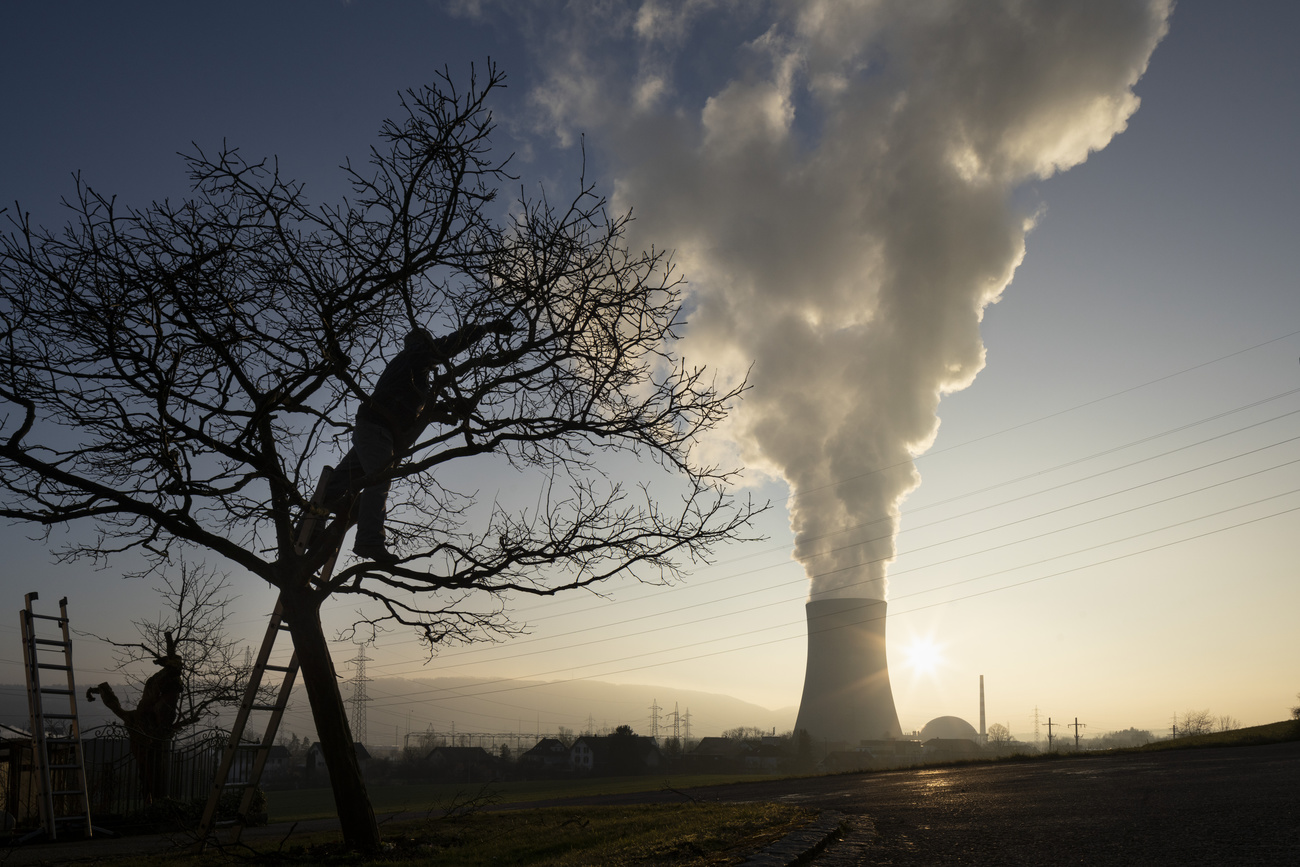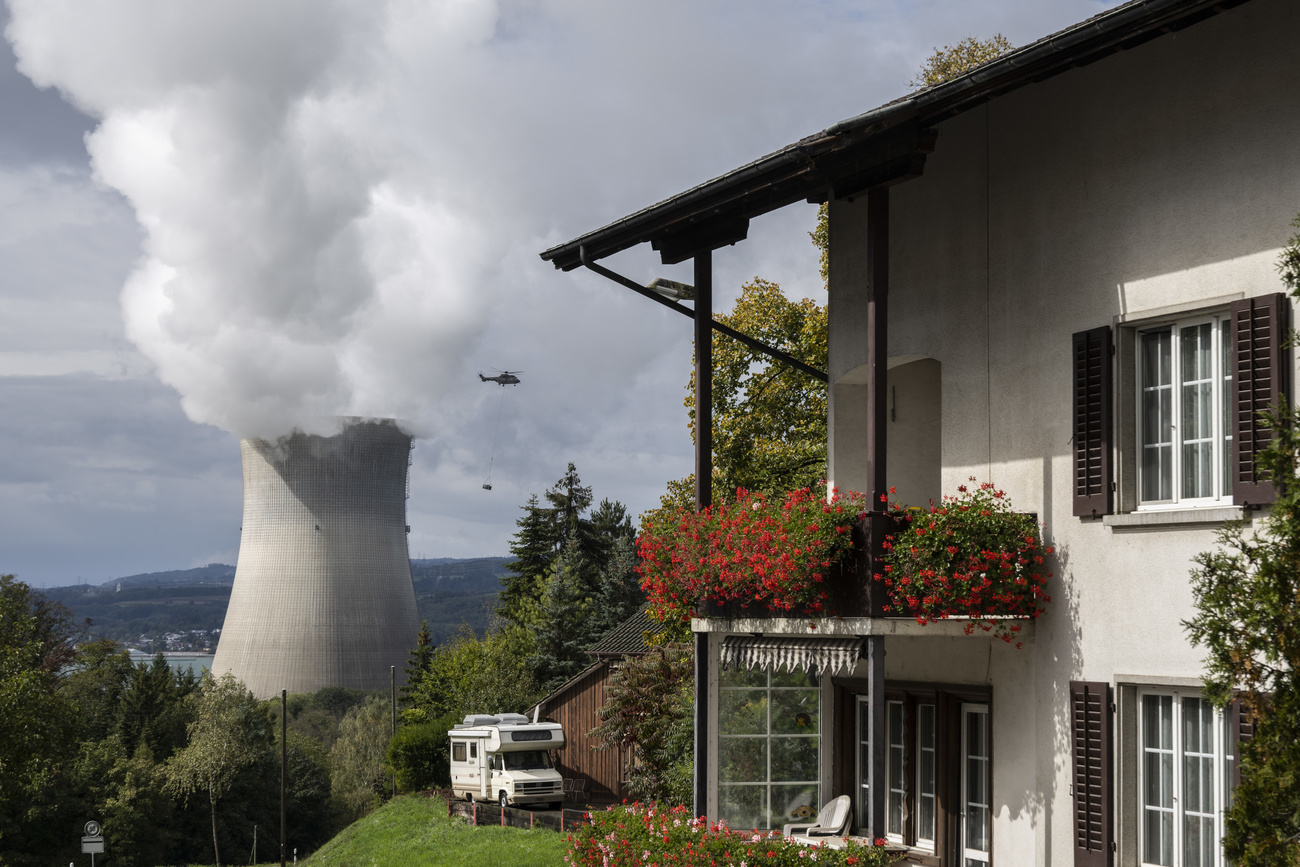
Could Switzerland build new nuclear power plants?

The Swiss government wants to overturn a ban on building new nuclear power stations that was approved by voters. While nuclear energy is enjoying a renaissance in certain countries keen to develop low-carbon energy sources amid rising electricity demand, its possible revival continues to divide in Switzerland.
It was described as a historic vote: in 2017 Swiss citizens approved the gradual phase-out of nuclear power in the Alpine country. This was the result of a long process initiated following the 2011 nuclear accident in Fukushima, Japan.
But this may not last much longer. Seven years on, the Swiss government says it’s open to ending a ban on the construction of new nuclear power plants in order to keep all options open for the country’s future energy mix.
Why does the government want to re-open the door for new nuclear plants?
There has been a “paradigm shift”, said Energy Minister Albert Rösti on August 28, citing the war in Ukraine and its impact on Russian gas imports as a key factor behind the about-turn.
He highlighted Europe’s energy security concerns, especially during winter, and noted technical issues at French nuclear plants that supply Switzerland. Population growth and slow renewable energy development due to legal appeals have further complicated matters.
“Since 2017, the situation on the electricityExternal link market has also changed radically,” said the minister. What’s more, last year voters backed a new climate bill aimed at steering the country towards carbon neutrality by 2050.
“We have decided to reduce the use of fossil fuels to net zero which requires the production of more electrictity,” said Rösti.
Doesn’t Switzerland already have enough nuclear power plants?
Switzerland has three aging nuclear power stations that generate roughly a third of the nation’s energy needsExternal link, with over half coming from hydropower.
Decommissioning began at the Mühleberg power station in 2019, leaving the others to operate as long as they remain safe, with a 60-year lifespan expected.
When the facilities eventually close, the government fears renewable energy may not be able to fill the gap. Originally, gas-fired power plants were under consideration, but this option is now “almost unthinkable” for achieving carbon neutrality, said Rösti.
He added that backtracking on the ban on new nuclear power plants was a “fallback option, just in case”.
In the medium term, hydropower, wind and solar are the only solution to increase electricity production, he said. But today it’s not possible to say if enough electricity can be produced long term with renewables. New nuclear power is “not an option” in the short or even medium term. “But to be ready, if it is necessary in the long term, in the next 15 years I would say, we must start now,” he stressed.
What’s the current nuclear power situation around the world?
Worries over energy security and climate change have been fuelling renewed interest in nuclear energy. Nuclear power accounts for 10% of electricity generation globally, rising to almost 20% in advanced economies.
Global nuclear power generation is set to reach an all-time high next year, according to the International Energy Agency (IEA).External link Nuclear generation is forecast to rise globally by 1.6% in 2024, and by 3.5% in 2025.

In Europe nuclear power had been declining until the start of Russia’s invasion of Ukraine. It has since attracted new interest as more European Union member states seek to secure energy supplies. The EU’s ambitious climate goals have led to countries such as Italy and Belgium overturning their previous opposition to new nuclear reactors.
Growth in the next few years is supported by a steady increase in output by the French nuclear power fleet as maintenance works are completed, by the restarting of reactors in Japan, and by new reactors coming online in various markets, including China, India, Korea and Europe. Most of the growth until 2026 is set to be concentrated in China and India. Meanwhile, both China’s and Russia’s influence in the sector is growing, with the two countries providing the technology for 70% of the reactors under construction.
At the UN’s COP28 climate summit in Dubai last year, over 20 countries, including the US, the UK and France, agreed to triple nuclear power capacityExternal link by 2050 as part of efforts to achieve net-zero emissions.
And in March this year, 30 global leaders and ministers from Europe and beyond pledged their support for nuclear energy at a summit in Brussels. The following month, parliamentarians ratified a reform of the EU electricity market, with a view in particular to boosting investment in low-carbon energies, such as nuclear power.
What have been the reactions to the Swiss government’s nuclear U-turn?
It was immediately criticised by environmental groups as well as centrist and left-wing parties, which highlighted the high costs and long construction time (15-25 years) needed to build new nuclear plants. They say this “irresponsible step backwards” risks blocking the development of renewables to meet Swiss climate goals.
New nuclear power plants are not profitable, said the president of the Center Party Gerhard Pfister. It “absolutely out of the question” to take money from the budget for renewable energies to help finance new nuclear plants with public subsidies, he told the Tages-Anzeiger newspaper.
But centre-right and right-wing parties welcomed the “reasonable decision”. Beyond 2050, Switzerland needs a climate-friendly and secure electricity supply all year round. It is the “right mix” that makes the difference, said Radical parliamentarian Christian Wasserfallen.
An editorial in the Le Temps newspaper also applauded: “While many countries have relaunched their civil nuclear programmes, including several Western democracies, our country must not take the risk of marginalising itself, even if in the end nuclear energy plays only a subsidiary and less central role than today.”
How likely could new nuclear plants emerge in Switzerland in the near future?
Switzerland’s plans for new nuclear power plants remain uncertain. The Federal Council has not addressed key issues like technology, uranium sourcing, waste storage, and costs, wrote Swiss public radio, SRF.
Currently, no new projects are planned in Switzerland, as energy companies face political and financial hurdles, with potential delays spanning two to three decades.
As a next step, the government will submit a proposal to amend nuclear legislation by the end of 2024 so it can be debated in parliament next year. If it goes ahead, the public will very likely have to vote again on the issue.
BKW and Axpo, two big Swiss electricity suppliers, are open to nuclear technology but caution that new plants would likely require state funding or subsidies to be viable. Both companies are pushing for faster renewable energy development.
Stephanie Eger, nuclear energy expert at the Swiss Energy Foundation, which is critical of nuclear power, told the Reuters news agency that, due to legal changes, financing, permits, and possible public opposition, building a new plant could take at least 35 years. Meanwhile, Andreas Pautz, head of the Paul Scherrer Institut’s Center for Nuclear Engineering and Sciences, predicts that if construction starts by 2040, nuclear plants might become operational by the mid-2040s.

More
Explainer: Is nuclear energy poised for a comeback?
Edited by Balz Rigendinger/amva

In compliance with the JTI standards
More: SWI swissinfo.ch certified by the Journalism Trust Initiative





























You can find an overview of ongoing debates with our journalists here . Please join us!
If you want to start a conversation about a topic raised in this article or want to report factual errors, email us at english@swissinfo.ch.